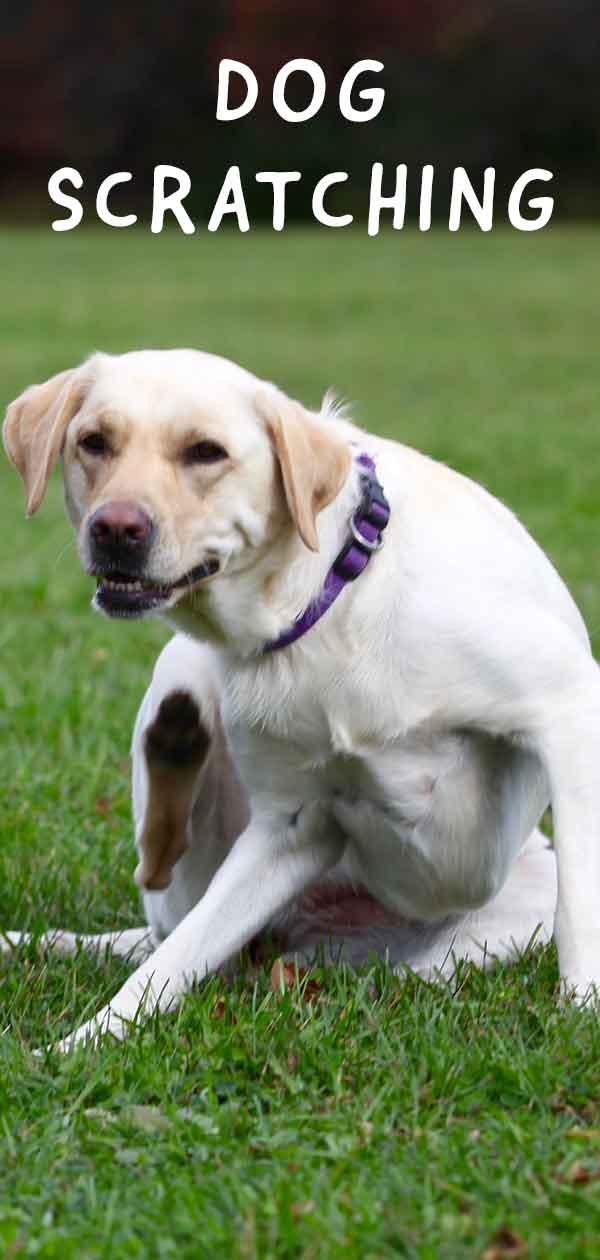How Can I Stop My Dog From Scratching?

How do you change dog scratching habits? The respond is to find the underlying reason why the dog keeps scratching and treat that. This article volition accept a await at some possibilities.
Why is my dog scratching so much?
A domestic dog licking and scratching themselves raw is only a symptom. Itchiness isn't a diagnosis in itself, merely a sign that something is incorrect. The trick to stop dog scratching is to pinpoint the driving forcefulness. The virtually mutual triggers for excessive scratching in dogs are parasites or allergies. A vet is all-time able to track downwards the problem. Seek a professional opinion sooner rather than afterwards, earlier the dog damages their pare and creates complications.
Itchy and Scratchy Symptoms
Does your dog sleep on the bed? If so, yous'll be well aware of the dog scratching all the time. At that place's nothing quite like the serenity of the night, with no distractions, for beingness the time to satisfy the urge to crawling. Equally an owner, take note of where the dog scratches. (And no, we don't mean "in the kitchen" or "in the living room.")
Some dogs scratch their ears, others their belly, while others rub their faces. This gives the vet clues equally to the nature of the problem.
What Can You Look For?
In fact, a dog scratching is not the only clue to itchiness. Some like to scoot their faces across the carpet or commando-crawl on their bellies across concrete as a means of quelling an itch. So in that location are the lickers. Licking can besides be a sign of itchiness. A tell-tale sign of a secretive licker is brown saliva-staining of the fur.
The classic places to check include the paws, butt, and belly. Unfortunately, excessive domestic dog scratching can harm their glaze and/or peel. This results in hair loss or skin infections, which require handling.
When to Seek Assistance
Does this audio familiar? "My dog is constantly scratching and biting himself!"

Excessive bitter, licking, or scratching is not normal and needs to be looked into. To ignore the problem means risking complications such equally yeast infections (causing greasy peel) or bacterial invaders (creating weeping sores.)
Indeed, whatsoever change in habits could mean the dog is uncomfortable. Something as simple every bit a dog scratching their face up could be a clue to any number of issues, from a grass awn stuck in the ear culvert to sore teeth. A dog scratching and losing hair or making their skin cherry definitely needs to be checked by a vet. Get your canine companion seen at the earliest hint of discomfort, and dodge unnecessary distress.
What Causes Canis familiaris Scratching?
Acme-most in your vet's listen when presented with a domestic dog scratching is to think, "Does this dog have parasites?" If a issues hunt proves negative, next under the spotlight is, "Could this domestic dog have allergies?"
Parasites and Excessive Itchiness
Who hasn't experienced the intense itchiness of a musquito bite? I bet you lot couldn't help but scratch! Simply like musquito or flea bites irritate human skin, the same tin happen to dogs. Indeed, some dogs even accept an allergy to flea bites, which makes them super-itchy.
Fleas are public enemy number one when it comes to domestic dog scratching. But when going on a flea hunt, be aware that fleas hop on to feed, but really alive off-canis familiaris in soft effects or the yard. Fleas aren't the only itchy hitch-hiker that can set a dog scratching. A bug identity parade of 'nearly unwanted' includes:
- Cheyletiella: A mite with the nickname "walking dandruff."
- Lice: Yuck! A dissimilar species to human caput lice, but super-itchy regardless
- Sarcoptic Mange Mites: These highly infectious scavenger mites are common on wild fauna
Parasites play such a leading role in a dog licking and scratching that the vet will eradicate bugs first, earlier doing other tests. If the fleas are gone and the patient is still itchy, so it'south time to dig deeper.
Allergies and the Urge to Scratch
Do you endure the misery of hay fever? The runny olfactory organ and streaming eyes are due to an allergy to pollen. Well, dogs also experience "hay fever." But the symptoms affect their pare, rather than nose and eyes. You guessed it! Allergies make dogs itchy. Unfortunately, dogs can exist allergic to anything from pollens to grass sap, from perfume to air freshener, from dust mites to mold spores.
Itchy Complications
A dog's best defense against allergies is healthy skin. Unfortunately, scratching and licking damages the skin. This tin can allow secondary invaders in, such as yeasts and bacteria. What'south ironic is these secondary infections are also itchy, which creates the cliché of a vicious circle.
Why is My Dog Scratching so Much? Reaching a Diagnosis
Outset off, go along a flea chase. Expect for those tell-tale flecks of night grit in the coat. Capture some on a piece of clammy cotton wool. If there's an orange halo around each speck, this is flea dirt. In this scenario, the first stride is to treat the domestic dog against fleas. If the dog scratching has not improved a calendar month afterward, the vet may suggest further investigation.
Typical actions include:
- Running a blood examination to discover sarcoptes mites
- Bathing the domestic dog with medicated shampoo to strength skin health
- A course of antibiotics if infection is nowadays
Still itchy?
- The dog is put on a hypoallergenic diet for eight weeks, in case they have a nutrient allergy
Oh dear, still itchy!
- Blood or pare tests for allergies
- A skin biopsy
How to Stop a Canis familiaris from Scratching: Treatment
Y'all tin do a surprising amount at home to brand an itchy dog more than comfortable. This includes:
- Regular use of an effective flea preventative production
- Bathing the dog with a hydrating shampoo to launder allergens off the skin'due south surface
- Feeding the dog a diet rich in antioxidants to strengthen skin immunity
- Giving a dietary supplement containing omega 3 & six oils, which are natural anti-inflammatories
- Reducing the levels of potential allergens, such every bit aerosol products, in the habitation
But if the dog keeps scratching, the vet needs to go involved. The vet will attempt to place and care for the cause of the crawling. This includes using antibiotics, medicated shampoos, and anti-inflammatory drugs.
Options for Treatment
If an allergy is diagnosed, there are options for treatment. Traditionally, this involves using drugs that suppress the crawling (we'll look at these shortly) but there are other not-drug options. These include:
- Immunotherapy vaccines: A bespoke vaccine is adult. This contains small amounts of the allergen that triggers the dog'southward itch. The idea is that giving small, but increasing amounts of allergen. This allows the immune system to become used to the allergen and turn off the unwanted exaggerated response.
- Biological therapies: The latest kid-on-the-block is Cytopoint. This injection, given every 4 – 8 weeks, isn't a drug but an antibody. It takes out the pathway that triggers the itch, stopping information technology from developing.
Sadly, both of the above are expensive. Still, in that location are a broad range of anti-inflammatory drugs which are also highly beneficial:

- Steroids: Inexpensive and extremely constructive. However, a high chance of side furnishings means they're often not outset selection.
- Cyclosporine (Atopica): Originally adult to prevent organ rejection in transplant medicine, these help switch off the unwanted allowed response. Effective and relatively side-effect-free, just expensive!
- Oclacitinib (Apoquel): A relatively new anti-itch medication, this works actually well for some dogs and is nigh side-result-free. Sadly, this besides is expensive.
Once an Itchy Canis familiaris, Always an Itchy Dog? Outlook and Prevention
There's good news and bad news. A dog scratching because of parasites can be cured. Getting rid of the bugs stops the itch. The less welcome news is that allergies can't exist cured, only only controlled. This means taking lots of pocket-sized steps. Making several small-scale changes adds upward to a big increase in comfort. Strategies to reduce the crawling include:
- Limiting exposure to allergens
- Improving skin health
- Washing allergens off the peel
- Controlling secondary infections, such as yeasts or bacteria
- Use of therapies such every bit immunotherapy vaccines
- Drugs to reduce the crawling
Why is My Dog Scratching so Much?
The occasional lazy scratch of the ear is quite normal. Excessive scratching in dogs is not. Mutual things like fleas are an obvious crusade of itchiness. But if your dog doesn't accept fleas, the explanation can be complicated.
If in doubt run across the vet early, to avert unnecessary complications such as hair loss or infections. After all, if the canis familiaris sleeps on the bed, getting rid of the itch means yous get a better night's sleep.
Readers Also Liked
- Tin can Fleas Alive on Humans?
References and Resource
- Bensignor, E. & Fabries, L. 'Utilise of Antipruritic and Rehydrating Foams on Localized Legions of Atopic Dermatitis in Dogs: A Pocket-size-Calibration Pilot and Comparative Double-Blinded Study', Veterinary Dematology (2018)
- Diaz, S. 'Canine Atopic Dematitis', MSD Veterinarian Manual (2020)

The Labrador Site Founder

Pippa Mattinson is the best selling author of The Happy Puppy Handbook, the Labrador Handbook, Choosing The Perfect Puppy, and Total Recall.
She is besides the founder of the Gundog Trust and the Dogsnet Online Training Program
Pippa's online training courses were launched in 2022 and yous tin can find the latest course dates on the Dogsnet website
desjardinscrent1944.blogspot.com
Source: https://www.thelabradorsite.com/dog-scratching/
Post a Comment for "How Can I Stop My Dog From Scratching?"